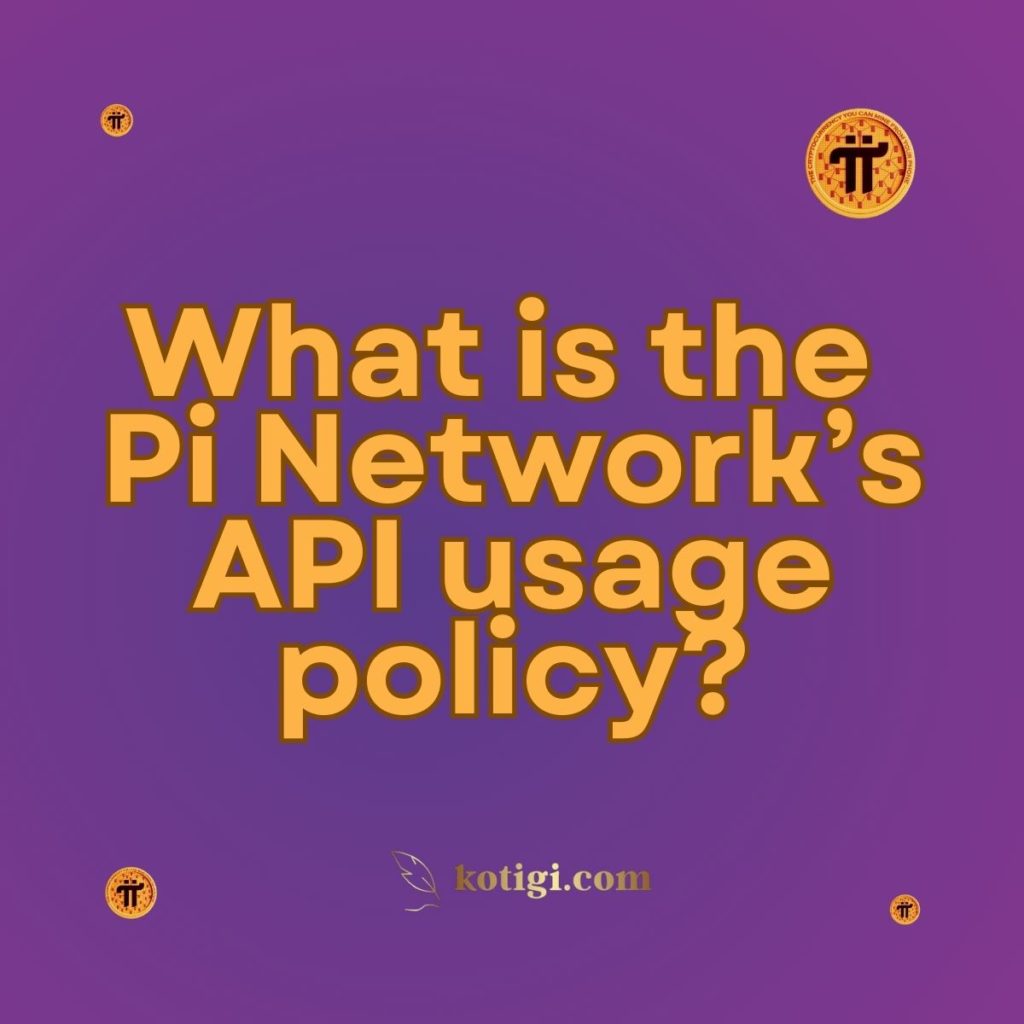
What is the Pi Network’s API usage policy?
The Pi Network’s API usage policy is outlined in the Developer Terms of Use, focusing on responsible use, protecting user data, and prohibiting abusive activities. The policy ensures that developers integrate with Pi Network safely, safeguarding the platform’s integrity. You can find more details here.
Introduction
Pi Network has grown into a prominent blockchain platform, attracting developers who seek to leverage its resources through APIs. Whether you are building a wallet app, blockchain analytics tools, or any other decentralized application (dApp), understanding the API usage policy is vital to ensure that your development efforts align with Pi Network’s rules and expectations.
The API usage policy defines the rules governing how developers can access and use Pi Network’s application programming interface. This post provides a detailed overview of Pi Network’s API usage policy, focusing on the essential guidelines outlined in the Developer Terms of Use. We will explore the key areas such as access rights, data protection, prohibited activities, and security requirements, giving developers the insights they need to safely and responsibly work within Pi Network’s ecosystem.
Overview of Pi Network API
What is Pi Network’s API?
Pi Network’s API, or Application Programming Interface, allows developers to interface with the blockchain and other resources that make up Pi’s ecosystem. By utilizing the API, developers can build applications that interact with the Pi Network in various ways, such as retrieving transaction data, engaging with user accounts, or enabling Pi-based payments. The API is a vital tool for integrating external apps with Pi’s decentralized infrastructure, providing developers the means to contribute to the platform’s growth and utility.
Importance of API for Developers
APIs serve as a critical bridge for developers, enabling them to access the functionalities of a platform like Pi Network. For blockchain ecosystems, APIs allow third-party developers to interact with the core network infrastructure without needing to dive deep into the blockchain’s complex layers. Pi Network’s API provides developers the tools they need to create apps that can integrate with the network’s blockchain, facilitating various operations like payments, user management, and data analytics.
Common Use Cases for Pi Network’s API
The Pi Network API is used by developers for a variety of use cases, including the development of wallet apps, blockchain explorers, social integration features, and payment processing tools. These applications enhance the Pi Network ecosystem, allowing users to engage with their Pi tokens and the platform more efficiently. Developers can also build tools that provide insights into transaction history, network activity, and other blockchain metrics that enhance the user experience.
Key Elements of Pi Network’s API Usage Policy
Access Rights and Limitations
Access to the Pi Network API is restricted and regulated under the Developer Terms of Use. Not all developers have unrestricted access to the API. Only approved developers, who have successfully applied and met Pi Network’s eligibility criteria, can interact with the API. Additionally, there are specific limitations imposed to ensure that the API is used efficiently and safely. For instance, developers must not make excessive API calls that could overburden the system, and only specific types of data are accessible through the API.
Prohibited Activities
The API usage policy outlines clear guidelines on prohibited activities, which are strictly enforced to maintain the integrity of Pi Network. Developers are not allowed to engage in activities such as data scraping, reverse engineering, or any actions that disrupt the API’s functionality. Using the API for unauthorized commercial purposes, transmitting malware, or engaging in any behavior that violates Pi Network’s terms can lead to immediate suspension and possible legal consequences.
Data Protection and Privacy Concerns
One of the most important aspects of Pi Network’s API usage policy is the protection of user data. Developers who use the API are required to comply with all applicable privacy laws, including ensuring that any user data collected through the API is handled responsibly and securely. The Developer Terms of Use prohibit unauthorized sharing or misuse of user data, and strict penalties are imposed for breaches in data protection.
How to Gain Access to Pi Network’s API?
Application Process for API Access
Developers interested in using Pi Network’s API must apply through the platform’s official channels. The application process requires developers to provide detailed information about their project, including the intended use of the API, the features they plan to build, and how their app will contribute to the Pi Network ecosystem. This vetting process ensures that only responsible developers are granted access.
Approval Criteria for Developers
Pi Network uses strict criteria when evaluating applications for API access. Developers must demonstrate that they understand and comply with the platform’s ethical standards and that their application will benefit the Pi Network ecosystem. Factors like the app’s contribution to user experience, the developer’s reputation, and compliance with privacy standards are taken into consideration during the approval process.
Maintaining API Access
Once granted, API access is conditional on continued compliance with Pi Network’s Developer Terms of Use. Pi Network reserves the right to review and audit developers’ usage of the API to ensure ongoing adherence to these terms. Developers who violate the terms or misuse the API may have their access revoked. Therefore, it is essential to follow the rules and maintain best practices throughout the lifecycle of an app.
Compliance with Pi Network’s Developer Terms of Use
Ethical Development Practices
Pi Network expects all developers using its API to follow ethical standards that protect both the platform and its users. Ethical development includes respecting user privacy, securing data transactions, and ensuring that the API is not used for harmful purposes such as unauthorized scraping or exploitation of the system. Pi Network’s guidelines prioritize the ethical treatment of user data, fair access to the platform, and the overall health of the ecosystem.
Legal Compliance
Developers are also required to follow all applicable legal regulations, including those related to data privacy (e.g., GDPR) and digital transactions. By complying with these laws, developers protect themselves and their users from legal repercussions while also safeguarding Pi Network’s reputation as a trustworthy platform. Pi Network’s Developer Terms of Use emphasize the importance of legality and compliance, reinforcing these practices as a cornerstone of responsible API usage.
Consequences of Violating the API Policy
Failure to adhere to Pi Network’s API usage policy can result in various penalties, including the immediate revocation of API access, suspension of accounts, and potential legal action depending on the severity of the violation. Developers are encouraged to regularly review the Developer Terms of Use to avoid unintentional breaches and ensure that their API usage remains within the platform’s guidelines.
API Rate Limits and Fair Usage
Understanding Rate Limits
Pi Network imposes API rate limits to prevent abuse and ensure fair use across the developer community. These rate limits restrict the number of API calls a developer can make within a set period, helping to balance the load on the platform’s infrastructure and avoid system overloads. The rate limits are in place to ensure that all developers have equitable access to the API without compromising the network’s performance.
Best Practices for Staying Within Rate Limits
Developers can stay within Pi Network’s rate limits by optimizing how they use the API. This can be achieved by reducing redundant API calls, caching frequently used data locally, and using batch processing for API requests. These practices help improve efficiency and ensure that developers do not unintentionally exceed their usage quota.
Consequences of Exceeding Rate Limits
Exceeding the set API rate limits may result in temporary throttling or suspension of API access. If developers repeatedly breach the rate limits, Pi Network may take further action, including permanently revoking access. It is crucial for developers to monitor their API usage carefully to avoid these penalties.
Ensuring Data Security with Pi Network API
Security Measures for API Integration
Security is a core element of Pi Network’s API usage policy. Developers are required to implement secure API integration methods, including the use of HTTPS for encrypted communication, secure storage of API keys, and following best practices to prevent vulnerabilities such as SQL injection or cross-site scripting. These security measures ensure that user data and the platform remain protected.
Handling User Authentication and Permissions
When interacting with Pi Network’s API, developers must use secure authentication methods, such as OAuth protocols, to manage user permissions. This ensures that only authorized users can access sensitive data or perform actions within the Pi Network ecosystem. Strong authentication protocols also help prevent unauthorized access and data breaches.
Protecting API Keys and Secrets
API keys are sensitive credentials that grant access to Pi Network’s API. Developers must take care to protect these keys, avoiding practices like hardcoding them into public repositories or sharing them with unauthorized parties. Regularly rotating API keys and using secure storage solutions can help mitigate risks associated with credential exposure.
Monitoring and Auditing API Usage
Regular Monitoring by Pi Network
Pi Network actively monitors API usage to detect and prevent misuse. This monitoring process ensures that developers adhere to the API usage policy and that the platform remains stable. By identifying potential issues early, Pi Network can take corrective actions before any damage is done to the platform or its users.
Self-Auditing for Developers
In addition to being monitored by Pi Network, developers are encouraged to conduct regular self-audits of their API usage. This includes reviewing logs of API requests, tracking usage patterns, and ensuring that their app remains compliant with the platform’s terms. Proactively auditing usage helps developers avoid issues that could result in penalties.
Reporting Issues and Violations
If developers encounter issues with the API or suspect that another party is violating the terms, they are encouraged to report these incidents to Pi Network. Reporting violations helps maintain the integrity of the platform, ensuring a positive and fair experience for all developers in the ecosystem.
Updates to Pi Network’s API Usage Policy
Staying Informed About Policy Changes
As Pi Network evolves, its API usage policy may change to accommodate new features, security needs, or operational requirements. Developers are responsible for staying informed about any updates to the Developer Terms of Use, ensuring that their apps continue to comply with the latest policies. Pi Network typically notifies developers of significant changes, but it is also wise to check for updates regularly.
How to Adapt to Policy Changes
When Pi Network updates its API policy, developers may need to adjust their applications to comply with the new rules. This could involve modifying how API calls are made, updating data handling practices, or adopting new security protocols. Staying agile and responsive to these changes is key to maintaining uninterrupted API access.
Conclusion
The Pi Network’s API usage policy is designed to promote responsible development, safeguard user data, and ensure the stable operation of the platform. By following the guidelines outlined in the Developer Terms of Use, developers can make the most of the Pi Network API while contributing to the growth and security of the ecosystem. Whether you are a seasoned developer or new to blockchain, adhering to these policies is essential for building successful and compliant applications within Pi Network’s ecosystem.
Key Takeaways:
- Pi Network’s API allows developers to build applications that integrate with the platform’s blockchain ecosystem.
- Access to the API is restricted to approved developers who meet specific criteria.
- The API usage policy emphasizes the protection of user data and prohibits activities such as scraping and reverse engineering.
- Developers must follow ethical and legal standards when using the API.
- Rate limits are imposed to ensure fair use, and exceeding these limits may result in penalties.
- Security measures, including secure authentication and API key protection, are critical for responsible API use.
- Regular monitoring and auditing of API usage help maintain compliance with Pi Network’s policies.





